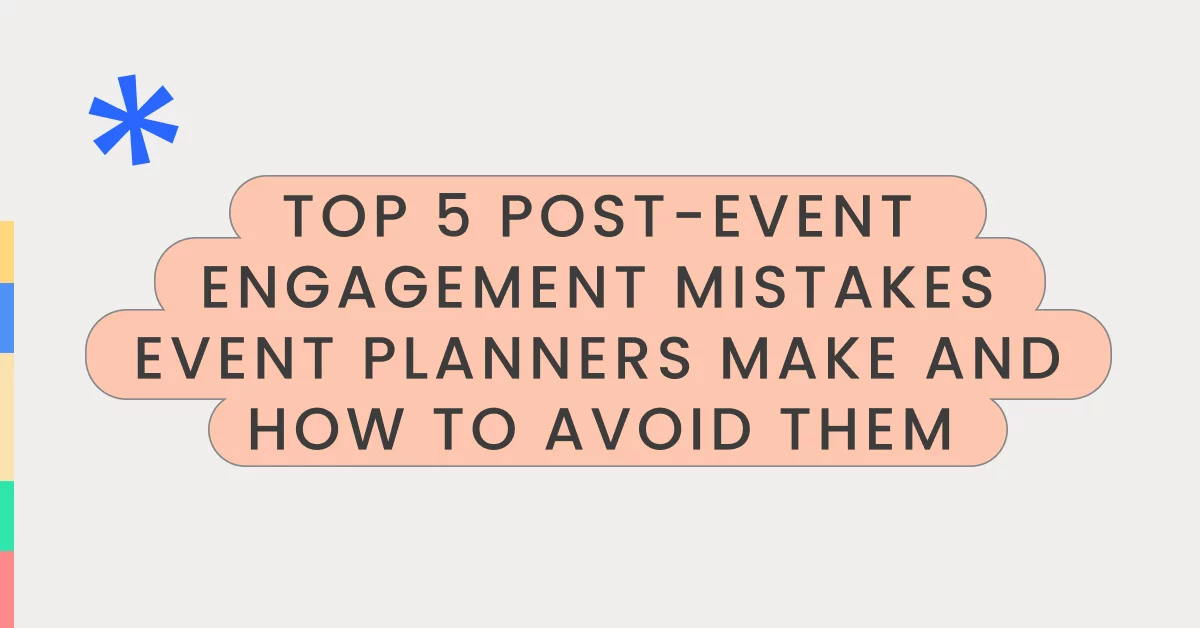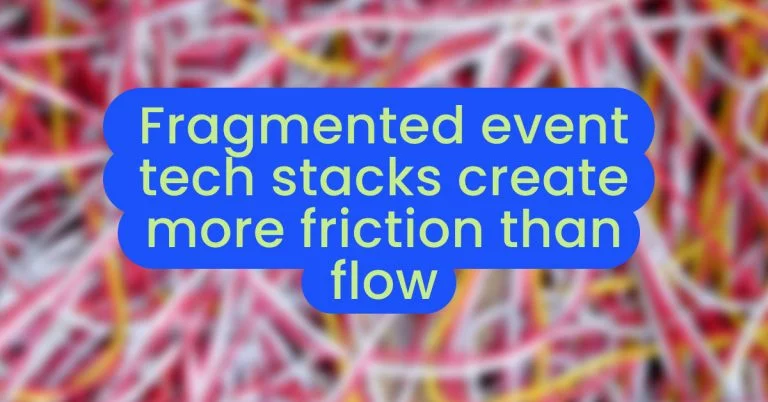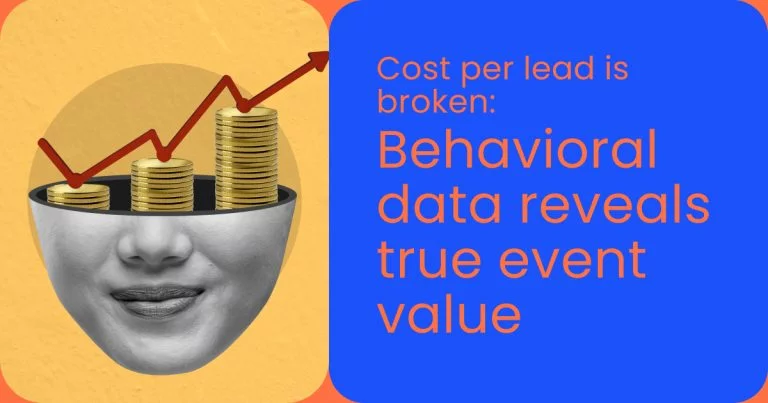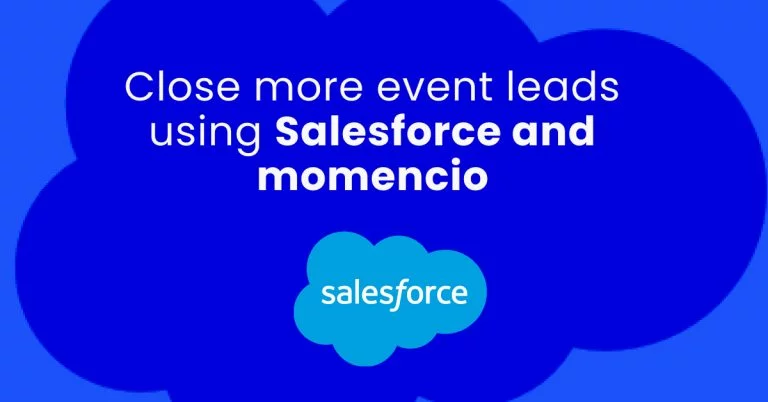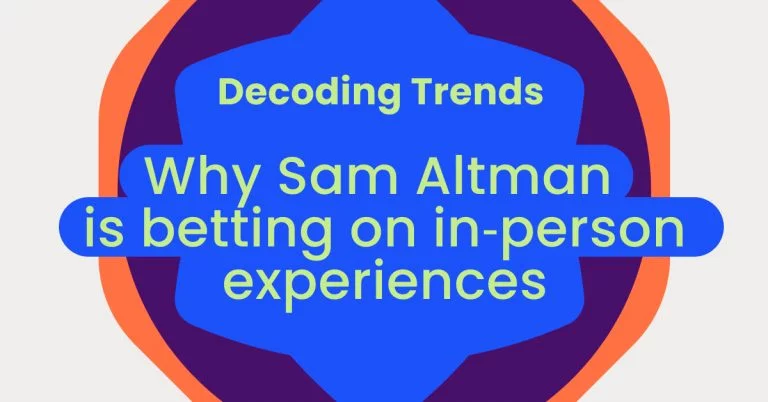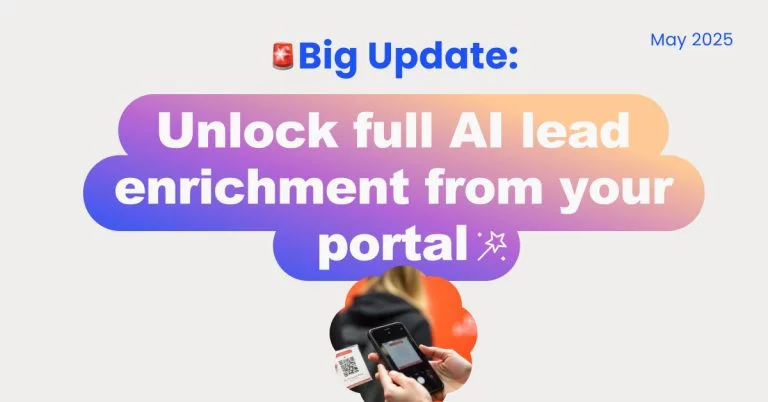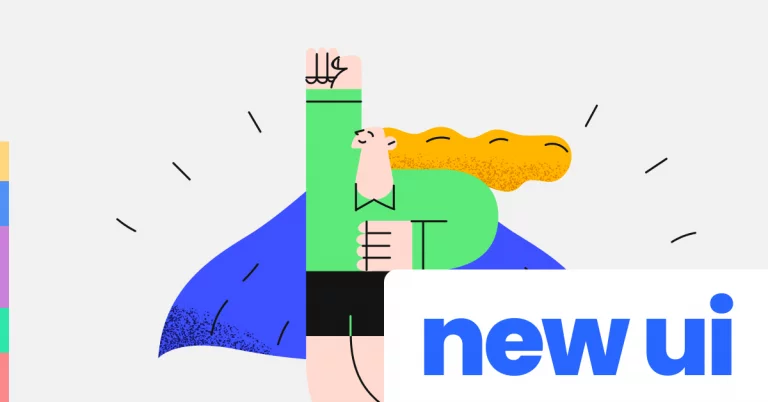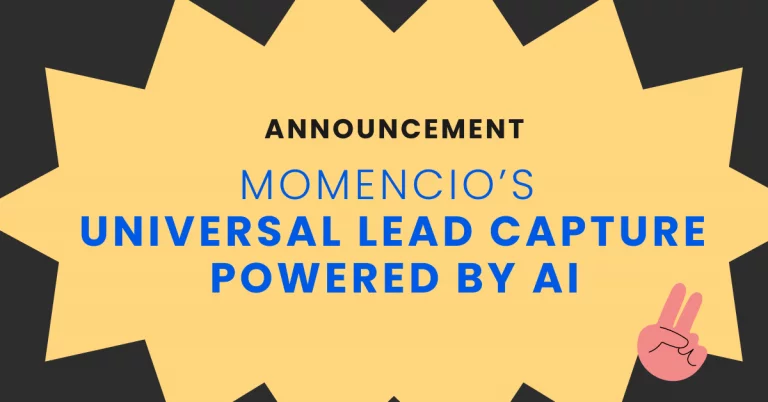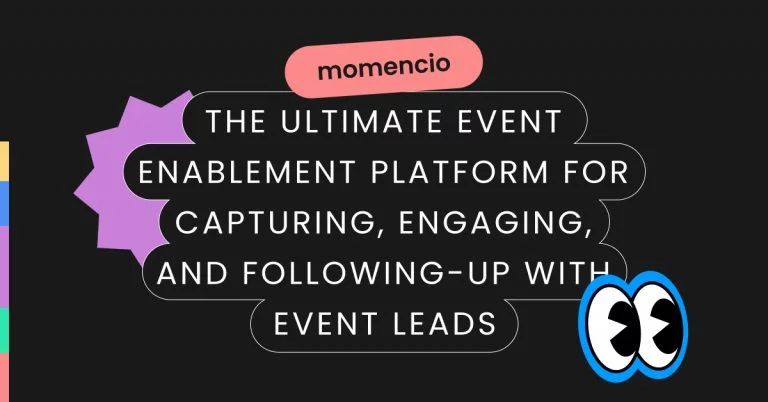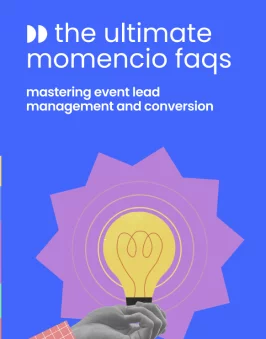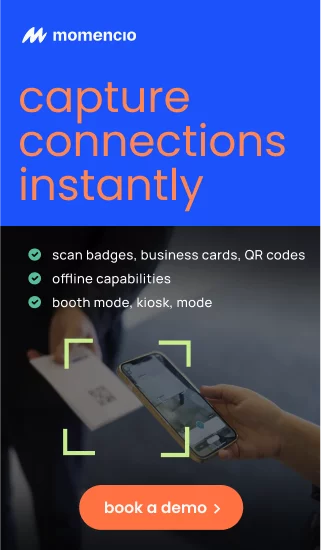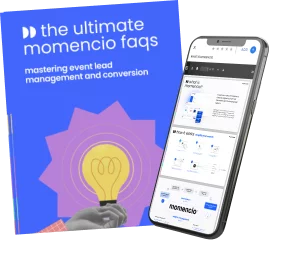Post-event engagement is crucial for transforming event attendees into long-term clients and advocates. However, many event planners miss out on this golden opportunity by making some common yet avoidable mistakes. This article aims to highlight the top five post-event engagement mistakes, offering insightful solutions and practical strategies to enhance your overall event success.
Recent studies, such as those from the Event Management Association, show that effective post-event engagement can increase attendee retention by up to 20% and improve lead conversion rates significantly. Understanding these mistakes and the strategies to avoid them not only helps in retaining the interest of your attendees but also boosts your event’s return on investment (ROI). Here, we’ll explore each mistake in detail and provide practical tips to enhance your post-event engagement efforts.
Top 5 Post-Event Engagement Mistakes Event Planners Make:
Mistake 1: Inadequate Follow-Up Timing
Overview and Consequences
One of the most common post-event engagement mistakes is not following up with attendees in a timely manner. The first 48 to 72 hours after an event are critical for capitalizing on the momentum and interest generated at the event. Delaying follow-ups can lead to a significant drop in engagement rates as attendees start to need to remember the connections and content they encountered. This lapse not only diminishes the potential for lead conversion but also affects the overall perception of your event’s effectiveness.
How to Schedule Effective Follow-ups
To avoid this pitfall, it’s essential to plan your follow-up strategy well before the event concludes. Here are several methods to ensure your follow-ups are both timely and effective:
- Pre-Event Planning: Prepare templates for emails, surveys, and social media messages in advance. Customize these based on different attendee interactions and sessions they attended to add a personal touch immediately after the event.
- Automation Tools: Utilize event management platforms like momencio to automate the follow-up process. These tools can trigger personalized emails and content based on specific actions taken by attendees, such as visiting a booth, participating in a survey, or attending a particular session.
- Immediate Acknowledgment: Send a thank-you message within 24 hours of the event’s conclusion. This message should thank the attendees for their participation and hint at more detailed follow-up communications to come, which help keep your event top-of-mind.
- Segment Your Audience: Not all attendees should receive the same follow-up message. Segment your audience based on their interest levels and interactions at the event. For example, send different messages to those who gave their contact information at a booth versus those who attended a keynote speech. This targeted approach increases relevance and engagement.
- Schedule a Series of Communications: Plan a sequence of communications post-event. The first follow-up, within 48 hours, might include general thanks and an event recap. Subsequent messages could provide additional resources, ask for feedback, or offer special promotions related to the event.
- Feedback Loop: Include a method for recipients to provide feedback on their event experience. This not only engages them further but also offers valuable insights for improving future events.
By ensuring that your post-event communications are prompt and relevant, you significantly enhance the likelihood of maintaining attendee interest and improving conversion rates. This strategy not only maximizes the impact of your event but also demonstrates your commitment to attendee satisfaction and ongoing engagement.
Check out 20 Post-Conference & Event Follow Up Email Templates
Mistake 2: Lack of Personalization in Communications
Importance of Personal Touches
In a digital world where generic mass emails are standard, personalization can set your post-event communications apart and resonate more deeply with attendees. A lack of personalization in follow-up messages can make attendees feel undervalued and reduce the likelihood of converting them into repeat participants or clients. Personalized communication is crucial because it demonstrates that you value the attendee’s individual experience and insights.
Strategies for Personalized Follow-ups
To elevate your post-event engagement, consider these strategies to infuse personalization into every communication:
- Use Detailed Attendee Data: Collect detailed information during the event registration process and through interactive sessions and activities. This data might include session attendance, topics of interest, questions asked during sessions, and even personal preferences expressed via surveys or polls.
- Segmentation Based on Interests: Utilize the data collected to segment your audience into different interest groups. For example, attendees who showed a keen interest in specific topics can receive follow-up emails containing further reading materials, webinar invites, or special offers related to those subjects.
- Dynamic Content in Emails: Employ dynamic content in your email campaigns, which changes based on the user’s past behavior or engagement level. For instance, attendees who interacted more during the event can receive more detailed follow-up content. In contrast, less engaged attendees might receive high-level summaries and invitations to future events to boost their engagement.
- Include Real Personalization: Beyond using the attendee’s name, personalize communications with references to sessions they attended or questions they asked. This shows that you are paying attention to their specific interests and experiences at your event.
- Follow-up with Human Touch: Consider a follow-up call or a personalized video message from a speaker they enjoyed. This can make the communication feel more direct and genuine, significantly enhancing the personal connection.
- Leverage AI for Personalization at Scale: Tools like momencio offer AI-driven insights that can help tailor follow-up messages based on the attendee’s engagement patterns and predicted preferences. This technology ensures that personalization is both scalable and effective.
Examples of Effective Personalization
- Personalized Thank You Notes: Send out thank you messages that reference specific interactions or sessions. For example, “Thank you for joining us at the cybersecurity workshop. We noticed you asked about safe browsing practices, and here’s a little more information on that topic.”
- Targeted Offers: For attendees who visited product demos, send special offers or extended trial periods for the products they showed interest in.
- Content Recommendations: Provide links to blog posts, white papers, and case studies that are relevant to the sessions they attended. This not only keeps the communication relevant but also extends the learning experience beyond the event.
By integrating these personalized strategies into your post-event engagement plan, you can significantly improve the effectiveness of your communications, thereby increasing attendee satisfaction, loyalty, and conversion rates. This attention to detail in follow-up efforts can transform a one-time attendee into a long-term client or advocate for your brand.
Mistake 3: Neglecting Data-Driven Insights
Overview of the Issue
After an event, many organizers fail to leverage the rich data collected during the event to inform their engagement strategies. This oversight can result in generic follow-up strategies that do not resonate with specific attendee segments, leading to missed opportunities for deeper engagement and conversion. Effective use of data ensures that each communication is targeted and relevant, significantly increasing the chances of achieving desired outcomes.
How to Use Event Data for Engagement
Utilizing data-driven insights for post-event engagement is crucial for understanding attendee behavior and preferences, which can guide more informed and effective follow-up strategies. Here’s how to make the most of your event data:
- Collect Comprehensive Data: Ensure you have a robust system in place for data collection during the event. This includes registration details, session attendance, engagement in polls and surveys, interaction at booths, and social media activity. Tools like momencio can integrate these data points into a cohesive analytics dashboard.
- Analyze for Key Insights: Post-event, dedicate time to analyze the data collected. Look for patterns such as the most attended sessions, topics that generated the most questions, or features that were most interacted with. These insights can indicate what your attendees found most valuable.
- Segmentation Based on Data: Use the insights to segment your audience more accurately. For example, attendees who spent more time at tech demos might be more interested in technical details and product updates. At the same time, those who engaged with keynote speeches might appreciate more strategic content.
- Personalize Follow-Ups Based on Behavior: Tailor your follow-up messages based on the specific actions attendees took during the event. If someone participated in a networking session, send them links to connect with speakers or other attendees. If they downloaded content from a session, follow up with additional resources on the same topic.
- Predict Future Interests: Use predictive analytics to forecast future interests of attendees based on their event behaviors. This can help in crafting follow-up content that anticipates and meets their needs before they even express them.
Tools and Technologies for Analyzing Post-Event Data
- CRM Integration: Ensure your event management software integrates seamlessly with your CRM. This allows for the automatic flow of data into your lead management systems, where it can be analyzed and acted upon.
- Analytics Platforms: Use platforms that offer detailed analytics on attendee behavior. Look for tools that provide visualizations of data trends and easy-to-understand metrics.
- AI-Driven Insights: Advanced tools like momencio utilize AI to offer deeper insights into attendee preferences and predict future behaviors, making your follow-up efforts not only responsive but also proactive.
Examples of Data-Driven Follow-Up Actions
- Content Customization: For attendees who showed a high level of engagement in specific topics, send specialized content like advanced white papers or exclusive webinar invitations.
- Engagement Scoring: Develop a scoring system based on attendees’ actions during the event (such as downloading materials, asking questions, or engaging in demos) and tailor follow-up intensity based on these scores.
- Feedback Requests: For those who provided feedback during the event, follow up with a personalized thank you note and possibly a small reward, like a discount code for future events, to encourage continued engagement.
By prioritizing a data-driven approach in your post-event strategies, you can significantly enhance the relevance and effectiveness of your communications, turning general follow-ups into personalized engagement opportunities that are more likely to convert.
check out here 19 Templates for Follow-Up Emails After a Meeting, Conference, and More
Mistake 4: Failing to Use Multiple Communication Channels
Benefits of Multi-Channel Engagement
Relying solely on one communication channel, such as email, can limit your reach and engagement post-event. Attendees have varied preferences for receiving information, and using multiple channels can increase the likelihood of your message being seen and acted upon. Multi-channel engagement also allows you to reinforce your message across different platforms, creating a cohesive and memorable post-event experience.
Examples of Channel Integration
To effectively leverage multi-channel communication, consider incorporating the following strategies:
- Email Campaigns: While email is a standard tool for post-event follow-up, ensure it’s part of a larger strategy. Tailor the content to reflect the interests shown by attendees during the event and include calls to action that guide them to other engagement platforms.
- Social Media: Use platforms like LinkedIn, Twitter, and Facebook to share event highlights, post photos, and promote blog posts summarizing key sessions. Tag attendees and speakers to increase interaction and visibility. Create a hashtag specific to the event to gather and share attendee posts.
- SMS and Messaging Apps: For more immediate calls to action, such as surveys or special offer announcements, use SMS or messaging apps like WhatsApp. These platforms often have higher open rates than emails and can be effective for quick reminders or engaging attendees in real time.
- Personalized Direct Mail: Send physical thank you cards or customized gifts to critical attendees. This can be incredibly impactful for VIP attendees or potential high-value leads. It shows a level of appreciation and effort that digital communications often cannot match.
- Webinars and Virtual Meetups: Post-event, organize webinars or virtual meetups to discuss critical topics from the event or address questions that might still need to be fully covered. This keeps the conversation going and helps maintain the community feeling.
- Interactive Online Platforms: Use your website or a dedicated event app to host interactive content like videos, downloadable resources, and forums for discussion. Encourage attendees to return to these platforms by regularly updating them with new content related to the event themes.
Integrating Communications Effectively
Here’s how you can integrate these different channels effectively:
- Consistent Messaging Across Channels: Ensure that your core message and branding are consistent across all platforms. This reinforces your message and increases brand recognition.
- Cross-Promote Channels: Use each channel to promote the others. For example, in your thank-you email, include links to your social media pages, mention an upcoming webinar, or direct them to a feedback form on your website.
- Track Engagement Across All Channels: Use analytics to track which channels are most effective at engaging your audience. This data can help you refine your approach for future events.
- Leverage Automation Tools: Utilize tools like momencio to automate the dissemination of messages across different channels. This can help maintain a consistent schedule of communications without overwhelming your team.
By diversifying your post-event communication channels, you not only increase the reach and effectiveness of your message but also cater to the preferences of a diverse attendee base, enhancing overall engagement and driving better results from your event follow-up efforts.
Mistake 5: Not Setting Clear Next Steps for Attendees
Importance of Actionable Next Steps
A common oversight in post-event engagement is failing to provide clear, actionable next steps for attendees. This mistake can lead to a disconnection between the event experience and the desired outcomes, such as further engagement, lead conversion, or more profound learning opportunities. Clearly defined next steps help maintain the momentum generated at the event and guide attendees toward meaningful actions that benefit both them and your organization.
Ideas for Clear and Compelling Calls to Action (CTAs)
To optimize post-event engagement, it’s essential to craft CTAs that are not only clear but also compelling and relevant to the attendee’s experience. Here are some strategies to ensure your CTAs effectively guide attendees toward desired actions:
- Summarize Key Takeaways: At the end of each event communication, whether it’s an email, social media post, or direct mail piece, include a summary of key takeaways and how attendees can apply them. This reinforces the value of what they learned and encourages practical application.
- Offer Relevant Resources: Provide links to additional resources such as white papers, blog posts, or videos that expand on the topics covered during the event. This helps deepen attendees’ understanding and keeps them engaged with your content.
- Invite to Related Events: If you have upcoming events, webinars, or workshops, specifically invite attendees to join these. Tailor the invitation to reflect on how these events build on what was discussed previously, creating a continuous learning journey.
- Encourage Network Building: Encourage attendees to join your organization’s LinkedIn group or follow your social media pages where they can connect with other like-minded professionals. Networking is a strong motivator for many event attendees and can lead to more sustained engagement.
- Prompt Feedback Submission: Ask for feedback on the event through a short survey link included in your follow-up communications. Offer an incentive for completing the survey, such as a discount on future events or exclusive access to post-event content.
- Engage with a Direct Action: For more commercial objectives, include a direct call to action, such as scheduling a demo, signing up for a free trial, or taking advantage of a post-event offer. Make the action easy to complete with a clear and prominent link or button.
Creating a Follow-Up Timeline
Effective CTAs are part of a well-planned follow-up timeline that keeps attendees engaged over time. Here’s an example of how to structure your communications post-event:
- Immediately After the Event: Send a thank-you email with a general overview of the event, express gratitude, and tease upcoming detailed communications. With momencio, you can send personalized email follow-ups inviting leads to further experience digital collateral even before they leave your booth.
- Within One Week: Send a more detailed follow-up that includes session recaps, links to presentations, and initial CTAs, such as downloading additional resources or joining a community group.
- Two Weeks After the Event: Follow up with direct CTAs for upcoming events or offers, and include a survey to gather feedback.
- Ongoing: Continue to engage with periodic updates about new content, events, and offers that are relevant to the attendee’s interests.
By providing clear and compelling next steps, you not only enhance the post-event experience but also significantly increase the likelihood of converting attendees into active community members, clients, or advocates. This approach ensures that the event has a lasting impact, driving both immediate and long-term engagement and success.
Reinforcing the Importance of Strategic Post-Event Engagement
After an event, the momentum and excitement can rapidly dissipate if not harnessed adequately through strategic post-event engagement. The top mistakes that event planners make — inadequate follow-up timing, lack of personalized communication, neglecting data-driven insights, failing to use multiple communication channels, and not providing clear next steps — can significantly impact the overall success of an event and the potential for lasting relationships with attendees.
Key Takeaways:
- Timeliness and Personalization: Quick, personalized follow-ups are crucial. They keep the enthusiasm alive and show attendees that their participation is valued on an individual level.
- Leveraging Data: Utilizing data collected during the event allows for tailored communications that resonate more deeply and drive engagement.
- Multi-Channel Approach: Employing a variety of communication channels ensures that messages are seen and acted upon, accommodating different preferences and enhancing overall reach.
- Actionable Next Steps: Clear and compelling calls to action provide attendees with easy and obvious ways to continue their engagement, whether through feedback, further resources, or additional events.
By addressing these areas, event planners can significantly enhance attendee satisfaction and improve the ROI of their events. Implementing these strategies will not only avoid common pitfalls but also set the stage for a robust post-event strategy that turns attendees into active participants and advocates for your brand.
Check out our article about Strategies for Post-Event Data Utilization: Fueling Growth and Engagement
FAQs
- What is post-event engagement?
- Post-event engagement refers to the strategies and actions taken to maintain contact with attendees after an event has concluded, aiming to solidify relationships, continue conversations, and encourage further interaction or conversion.
- How long after an event should you follow up?
- Ideally, initial follow-up should occur within 24-48 hours after an event to capitalize on the attendees’ fresh memories and enthusiasm. Subsequent, more detailed communications can follow over the next few weeks.
- What are the best tools for post-event analysis?
- Tools like CRM systems integrated with event management platforms (e.g., momencio) provide comprehensive analytics on attendee behavior, engagement levels, and more, helping to tailor post-event communications effectively.
Interesting Facts from Research
- Engagement Statistics: Research indicates that personalized post-event follow-ups can increase attendee engagement rates by up to 35%.
- Communication Preferences: Surveys show that over 60% of event attendees prefer multi-channel communications post-event, highlighting the importance of using various platforms for follow-up messages.
Ready to transform your post-event engagement strategy? Explore how momencio can streamline your follow-up processes, from automated personalized emails to comprehensive analytics. Book a demo with momencio today and discover how you can turn your event leads into lasting relationships and measurable success.
By meticulously planning and executing your post-event engagement strategy and integrating sophisticated tools like momencio, you ensure that every attendee interaction is maximized for impact, fostering an environment where relationships and ROI flourish post-event.
